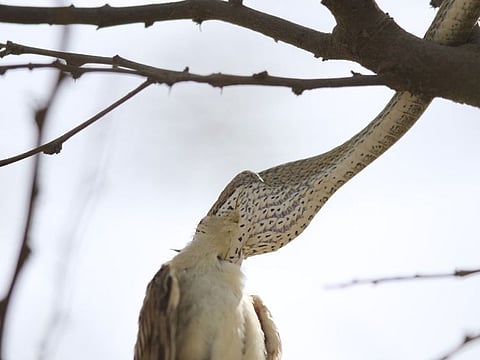Watch: Dubai wildlife specialist shares images of snake swallowing a sparrow
Footage shows how nature works, but here's a warning: It's not for the screamish

Also In This Package
Dubai: It was a balmy Friday morning and Dr. Reza Khan, wildlife specialist and former head of Dubai Zoo, was doing his usual rounds checking the wildlife at Al Qudra Lakes when he spotted a five-foot long snake lurking for its prey.
The predator was Schokari Sand Racer, also called Arabian Rearfang or Hissing Sand Snake, and the target was a sparrow inside a nest.
“I was looking for Egyptian Nightjars (nocturnal birds rarely seen in the UAE) when I heard sparrows and bulbuls (songbirds) being disturbed from the tree. Then I saw a snake – around five-foot long – hissing and making its way to the nest,” Dr Khan, who filmed the entire incident, told Gulf News.
***Warning - some viewers may find the following footage disturbing ***
The snake belongs to a family of serpents that is considered as the longest land snake in the region. A full-grown snake could reach between four to five feet, but some could reach up to six feet. It is mostly light brown in colour with pale stripes from head to tail. It thrives in the desert and can be found on land, rocks and trees. It also lives in farmland, oasis and hilly areas.
True to its name, the reptile moves like a racer on the desert sand. It can literally do sand-gliding. It is diurnal or active during the day, and feeds on lizards, birds and sometimes rodents.
On that day, the menu was a sparrow.
Dr Khan said he filmed the incident and shared it with Gulf News to give the public an idea about how nature works – specifically how a snake swallows its prey.
“The sand snake moved quickly and immediately made its way inside the nest. After a few seconds, the snake had already taken the head of the bird,” recounted Dr Khan. He added: "But it took almost an hour for the serpent to completely swallow the bird. While suspended in the tree, the snake widened its upper and lower jaws to entirely swallow its prey.”
It did not lunge at him. After consuming the sparrow, the snake slowly went down the tree and made its way to the bushes.
Harmless to humans
Dr Khan said the Sand Racer is a non-venomous common snake and harmless to humans. “People have no reason to kill it,” he said.
But if someone sees a snake, Dr Khan's advise is to call Dubai Municipality on its emergency number - 800900.
“The operator will pass the line to the vet or pest control section or to Dubai Safari, who will send professionals to have the reptile picked up,” Dr. Khan said.
He earlier told Gulf News: “Snake bites are very rare in the UAE. But in the unlikely situation where someone has been bitten by a snake – they must reach a hospital within an hour.”
“Antivenin or anti-venom for venemous UAE snakes are usually kept at Rashid Hospital in Dubai, Al Qasimi Hospital in Sharjah and some other hospitals. Call for an ambulance immediately. That would be the best thing to do,” he added.
Sign up for the Daily Briefing
Get the latest news and updates straight to your inbox









